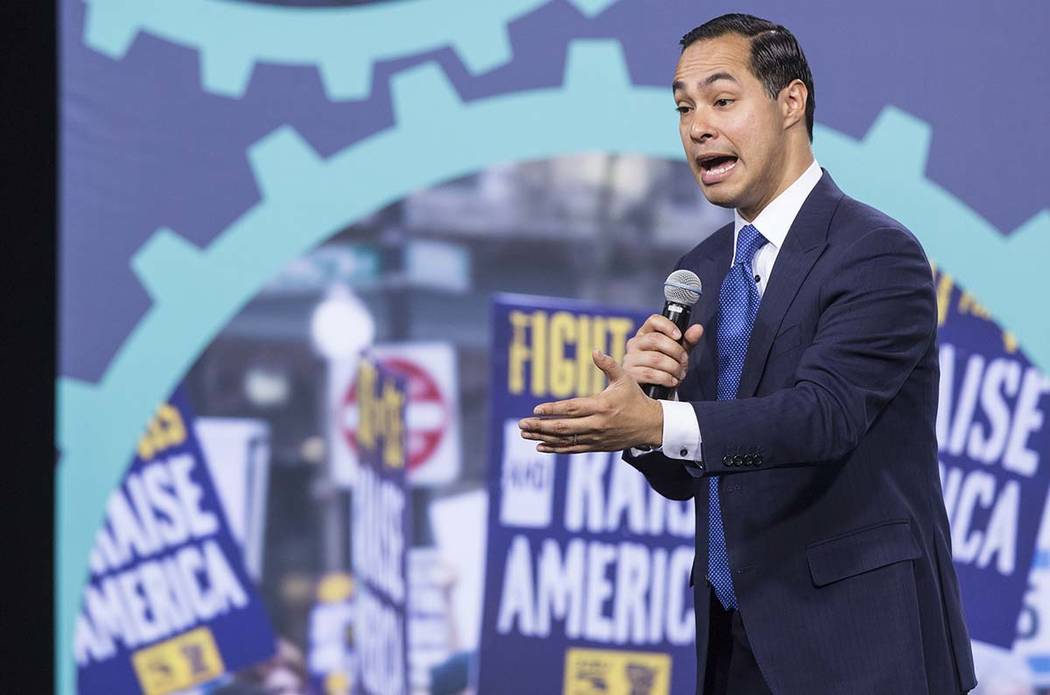Castro’s labor plan focuses on domestic, farm workers
Democratic presidential hopeful Julián Castro unveiled a 10-page labor policy Wednesday that he said would dramatically improve the quality of life for America’s workers, with a particular focus on two key Nevada labor groups: domestic workers and trade unions.
“The challenge for America in the years to come is to keep up with the needs of our workers as the economy changes, and this plan does that,” the former HUD secretary said in an interview with the Las Vegas Review-Journal.
Castro said his plan would compensate 21st century workers and provide benefits in a way that mirrors how they were decades ago.
Sections of the plan, provided to the Review-Journal before its release, are similar to those of others in the Democratic field.
Castro hopes to strengthen the National Labor Relations Board, double union participation, raise the minimum wage to $15, guarantee 12 weeks of paid family or medical leave and outlaw the “right to work” laws in place in Nevada and other states.
But Castro’s campaign believes its plan tackles two underserved labor communities — domestic workers and farm laborers — in a unique way.
Bill of Rights
He supports a Domestic Workers Bill of Rights introduced by Sen. Kamala Harris, D-Calif. Castro said his government would offer overtime pay, increase benefits and leave, prevent retaliation against workers reporting abuse and establish supportive housing for those forced to work through human trafficking.
Castro said his grandmother, Victoria, came to America from Mexico as a recently orphaned 7-year-old and worked her entire life as a maid, babysitter and cook for wealthy white families to support his mother.
“Every family should be able to prosper,” Castro said. “To have good protections and benefits. And we need to make sure the most vulnerable workers are protected.”
Domestic workers would get a boost from the plan’s “sectoral bargaining” platform, which Castro said would allow industrywide bargaining for better wages and benefits.
Hotel workers, for example, could bargain for more universal standards in the hospitality industry, rather than unions having to wage a series of labor battles with each individual hotel group.
Castro said a similar model has helped improve the quality of life for fast-food workers in New York state.
Farm workers
The plan also calls for significant protections for agricultural workers.
It would establish base pay, health and safety standards, clean water rules, better housing options and increased protections for farm workers facing harassment.
Families would receive stipends during the harvest in order to keep them from pulling their children out of school to help make money, and a $50 million scholarship program would be implemented to help those children finish high school and attend college.
The federal government would also offer to purchase land from retiring growers and give it to minority workers seeking to own their own farms, Castro said. He would also establish a direct path to citizenship for farm workers.
Castro, the only Latino in the race, said domestic and farm workers often face significant, sometimes racially charged hardships unlike those in other industries. He said reforming the immigration system, which he has promised to do in his first 100 days, would also lift burdens faced by these workers.
National plans
On the national front, Castro also hopes to end the “gig economy” with a plan similar to one passed in California’s last legislative session.
“There are benefits to the gig economy, but one of the drawbacks is companies routinely classify workers as independent contractors instead of employees and write them out of decent benefits or wages,” Castro said. “This would ensure workers are paid a decent wage and enjoy the benefits they are entitled to in the first place.”
Castro said he would also take executive action to improve wages and benefits for public workers, such as teachers and government employees, who “have been left out of many federal labor protections.” He noted a recent rash of teacher strikes, “from Arizona to West Virginia,” and said his plan would help “perennially underpaid” educators. (A threatened strike in Las Vegas didn’t materialize last month after the Clark County School District and the Clark County Education Association came to an agreement.)
Castro also supports the Workplace Democracy Act, a sweeping bill strengthening the rights of collective bargainers and first put forward by Sen. Bernie Sanders.























